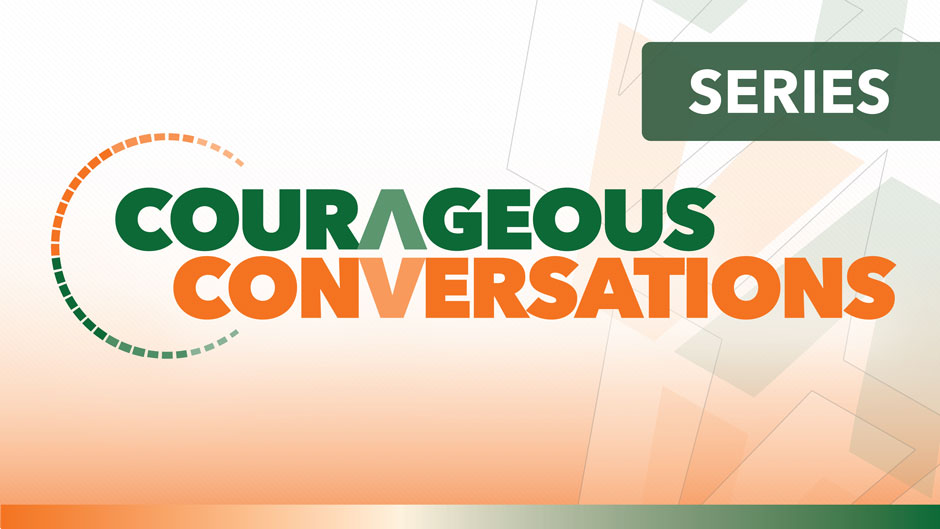Bao Duong’s message was clear: the eight lives lost—six of whom were Asian women—at three Atlanta-area spa businesses last month were more than just a number.
“I know sometimes victims can be summarized as a statistic, when really we are talking about such beautiful people and it’s important to recognize that,” Duong said. She commented that she was honored to be the only undergraduate panelist on Wednesday evening during the second installment of Courageous Conversations, an online event designed by the Office of the President and Student Government to build community and find solutions to topics related to diversity, equity, and inclusion.
Duong, president of the Asian American Student Association (AASA), emotionally shared that when she thought about the March 16 shooting on a personal level, her “heart dropped.” And she couldn’t help but think of her own mom, who was born in Vietnam, when she saw photos of the victims.
“I had to take a day off. And know a lot of the students had to as well. Because we think about our parents, we think about our loved ones, and we worry about them,” said Duong, a junior studying neuroscience. She pointed out that even her parents were afraid for her safety because she was speaking at the event and had spoken to media outlets about the tragedy. They feared she would face retaliation.
Duong was one of four panelists who discussed the prejudice being faced by members of the Asian American Pacific Islander community. Abigail Adeleke, outgoing Student Government president, moderated the discussion. University President Julio Frenk; Yunqiu (Daniel) Wang, a senior lecturer and biology adviser; M. Evelina Galang, a Department of English professor and author; and Ikchan An, an international graduate student at the Miami Herbert Business School made up the panel of guest speakers.
During his opening remarks, Frenk condemned the attacks and emphasized solutions to put an end to the increased violence and hatred.
“When members of our community are hurting, we are hurting,” said Frenk, an advocate and ally for all marginalized communities at the University. “When they take action, we stand with them.”
In moving toward solutions, he announced that awardees have been selected for the inaugural Racial Justice Grant Program, and the names will be shared on Monday.
During the online event, Galang provided historical context of anti-Asian hate in the United States during her powerful opening statement. She cited the Chinese Exclusion Act of 1882, which initially prohibited Chinese immigration for 10 years but lasted much longer. And it made Chinese immigrants ineligible for naturalization. Galang also pointed to recent labels from the former presidential administration calling the novel coronavirus the “kung flu.” She made it clear that AAPIs have been suffering from prejudice long before the pandemic.
“This anti-Asian hate toward our brothers and sisters, our father and mothers, and most of all our elders, is not new,” said Galang. “It is my sincere belief that we must speak our truth.”
Wang echoed her sentiments and encouraged all to “face it” as our country’s history and truth.
“A recent report by the University of California in San Francisco directly linked Trump’s first tweet about the Chinese virus to a significant increase in anti-Asian hashtags,” said Wang. “According to a separate report, anti-Asian hate crimes in 16 U.S. cities increased by 149 percent.”
Near the end of the event, Adeleke asked the panelists questions submitted by audience members. Many of the submissions showed concern, offered sympathy, and asked for guidance on how to provide support to the Asian American community.
In response, Galang replied: “The thing that I want to say to the Asian American students, the Filipino students, my friends out there who are going through this on the campus, it’s not really our problem to fix,” said Galang. “Rather than asking us Asian Americans what do we need to do, perhaps you as a community can be proactive, perhaps you can start taking those courses, take history lessons, where mainstream culture becomes the learners, the listeners, the ones taking action.”
The University of Miami and the AAPI student groups have organized support groups, workshops, counseling, resources, and guidelines for reporting racist incidents on campus.
“I want to express my deep hope that tonight’s discussion has accentuated why we cannot stay silent when anyone in our ’Cane community is attacked, judged, placed in a category, or unfairly decimated against because of an aspect of their identity,” said Frenk.
The final Courageous Conversations discussion for the semester is scheduled for April 19. Additional information will be shared at a later date.

